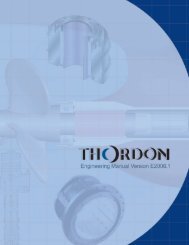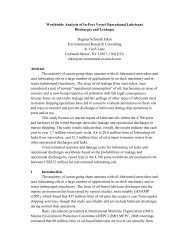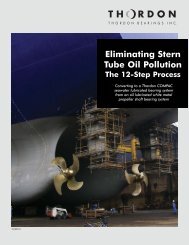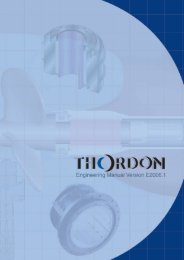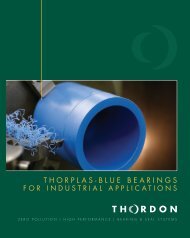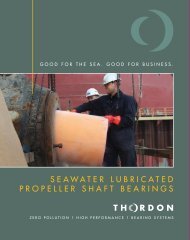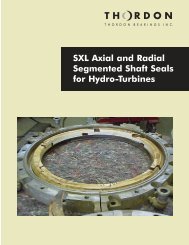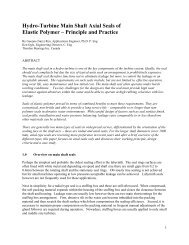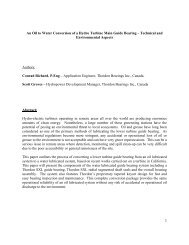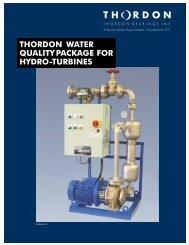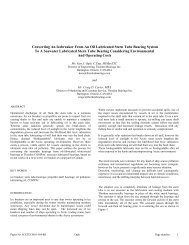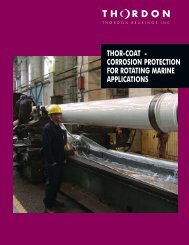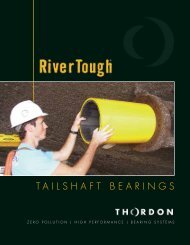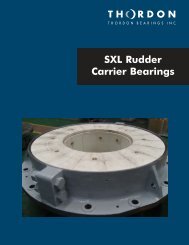Oil Lubricated Stern Tube Discharges - Thordon Bearings
Oil Lubricated Stern Tube Discharges - Thordon Bearings
Oil Lubricated Stern Tube Discharges - Thordon Bearings
You also want an ePaper? Increase the reach of your titles
YUMPU automatically turns print PDFs into web optimized ePapers that Google loves.
Figure 3. North Sea CleanSeaNet oil slick detections via satellite in 2008<br />
Most slicks are detected by CleanSeaNet along the main maritime traffic routes in Europe as shown in Figure<br />
3. This indicates that illegal discharges from ships are still an important source of pollution that causes<br />
significant damage to the marine and coastal environment.<br />
Most ship owners and operators believe stern tube oil leakage is minimal and consider the oil lost as “normal<br />
operating consumption”. The only true numbers for stern tube oil leakage can be gained from those ship<br />
owners and operators who are also spending money on oil to keep their stern tube in working order.<br />
WHAT ARE THE CONSEQUENCES OF STERN TUBE LUBRICATING OIL<br />
DISCHARGES FOR SHIP OWNERS AND OPERATORS?<br />
First and foremost, stern tube lubricating oil discharges cost ship owners and operators money. Typical<br />
emergency seal repairs to fix/replace a leaking seal can be up to US$200,000. They can’t afford to leak oil<br />
as pollution and the preservation of the environment are big concerns for the shipping industry. A<br />
growing number of new environmental regulations are being considered and enacted by a number of<br />
countries, particularly the United States, Canada and the European Union.<br />
U.S.A.<br />
Clean Water Act<br />
The Clean Water Act requires that any spill or discharge that results in a sheen on the navigable<br />
waters in the contiguous zone (24 nautical miles from baseline) of the United States, be immediately<br />
reported to the National Response Center by telephone (1-800-424-8802) or other means.<br />
<strong>Oil</strong> Pollution Act of 1990 (OPA ‘90)<br />
The OPA’90 established limits of liability for cleanup costs and damages to be paid by responsible parties in<br />
oil spills. However, because of the availability of strict liability criminal sanctions as well as criminal sanctions<br />
for simple negligence under United States laws for spills in United States navigable waters, vessel<br />
crewmembers and corporate officers of corporations that own or operate vessels face potential criminal<br />
liability for practically any oil spill. This is true even when the spill is small or the resulting environmental<br />
damage is minor.<br />
Polluters pay. The responsible party (the owner, operator or charterer of a vessel) must pay for the cleanup<br />
within certain liability caps. Parties that fail to notify the proper authorities of a spill are now subject to greater<br />
fines and longer prison terms. Civil penalties have also been toughened, with the owner of a vessel or facility<br />
that discharges oil or a hazardous substance liable for up to $37,500 a day in fines.<br />
National Pollutant Discharge Elimination System (NPDES) Vessel General Permit (VGP) for<br />
<strong>Discharges</strong> Incidental to the Normal Operation of Vessels (Dec. 18, 2008)<br />
3



